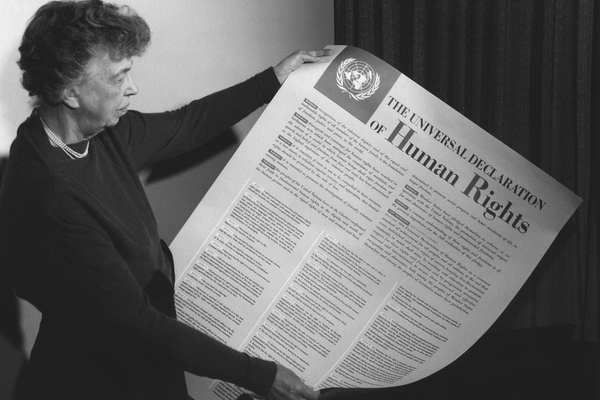Seven Years from the "Day of Infamy" to "Human Rights Day"

This month has provided us with two historical dates that should give us pause to reflect on one world fading into memory as another is still being determined.
Monday, December 7 was the 79th anniversary of the Japanese attack at Pearl Harbor, the singular event that brought this country into World War II. Thursday, December 10, 1948 was a bookend of a sort: one of the results of the war was the inaugural International Human Rights Day.
This month our news broadcasts interview former U.S. soldiers and sailors who had been stationed in Hawaii at Pearl Harbor, then as young men in their late teens and early ‘20s. They visually remind us that their generation is passing away, and that soon there will be no one left to talk about that era from firsthand experience.
The imperial Japanese army had been rampaging across Asia since 1932, and Adolf Hitler, who had come to power in Germany in January 1933, had unleashed his forces against Poland in September 1939. When the war was brought to its merciful conclusion in 1945, the horrors and atrocities of an incomprehensible scale were only just beginning to become known — but not yet fully understood.
Some 70 million people had been killed in the war. Two-thirds of the Jews of Europe, almost 6 million individuals, had been annihilated merely because of who they were; five million others, including, Slavs, Jehovah’s Witnesses, the handicapped and Europe’s gays and lesbians, had been similarly targeted for extermination. The Holocaust had been the secret war within the war…but in 1945, no one knew anything about the tragedy called the Holocaust. Names such as Dachau, Mauthausen, Auschwitz, Treblinka and Belzec were barely in the public domain, if at all.
The world did not yet know of Nazi or Japanese medical experiments conducted against millions of innocent people, nor was there any knowledge of the massive crimes against women. No one knew of “Comfort Women,” females used as sex slaves for Japanese troops, or the mass rape of 2 million Germans by invading Soviet forces.
Cities across Europe and Asia lay in ruin from massive bombing raids. London, Hamburg, Dresden, Warsaw, Shanghai, Tokyo, and both Hiroshima and Nagasaki had been destroyed or obliterated in premeditated attacks. Millions of people were either living in displaced persons camps or were wandering as refugees searching for a home to return to or a new country which would admit them.
Attempts at justice had begun with the formation of the United Nations War Crimes Commission, and both the Nuremberg and Tokyo War Crimes trials. Defendants were convicted of war crimes, crimes against humanity and crimes against the peace, and their frequent defense of “I was only following orders” was dismissed as unacceptable. The Axis Powers’ vision of a New World Order based on militarism, mass murder and genocide, and brutality, had been defeated.
The victorious Allies had formed the United Nations with the hope of creating a world based on peace, respect and human dignity. Dec. 10 commemorates International Human Rights Day, marking the signing of, and near-global commitment to, the paradigm-changing Universal Declaration of Human Rights. Most notable is Article 1, which guarantees that all persons, everywhere, regardless of who they are, are fundamentally entitled to a life with dignity and rights.
Yet 1948 itself provided difficult and momentous events and challenges. Mahatma Gandhi was assassinated in India, sparking violence and tension between Hindus and Muslims. The UN created the nation of Israel, which was promptly attacked by her neighbors. Communism came to mainland China, and apartheid was instituted by the repressive regime in South Africa. The Cold War saw tensions nearly boil over when the Soviet Union blockaded Berlin, and much of the pre-war European colonial empires in Africa and Asia collapsed as countries such as Ceylon (Sri Lanka), India and Malaysia secured their independence.
In the 72 years since its signing, the UDHR provided a framework guaranteeing all people certain inalienable civil, political, cultural, social and economic rights. Clearly we still deal with humanity’s bad behavior of genocide, hate crimes, discrimination and conflict…. but the world has unmistakably moved forward in an overall positive direction in attempts to secure fundamental rights and dignity for all peoples, regardless of their race, ethnicity, national origin, faith, language, gender and sexual orientation.
As 2020 comes to a close, even in the midst of a terrible pandemic which may claim 300,000 U.S. deaths by year’s end, we would do well to pause and reflect upon how much progress has been made, and still needs to be made, in the struggle for human rights. We are coming closer to fulfilling the promise the world made at the end of World War II, namely, that there is no such thing as a lesser person.